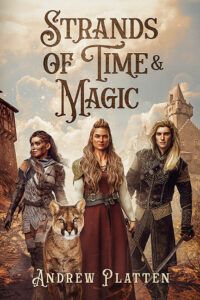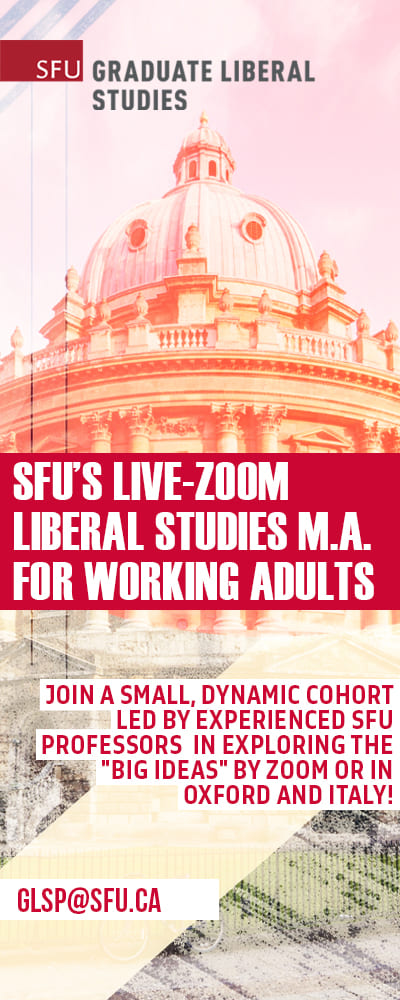Mages, time travel, a telepathic cat
Strands of Time & Magic
by Andrew Platten
Seattle: Amazon, 2023
$19.99 / 9781738101603
Reviewed by Sheldon Goldfarb
*

A professor of mine once said that a good way to understand a book was by reading its acknowledgements. She was talking about biographical studies and how you could learn about the biographer’s approach by seeing if this was an authorized study, but in this case you can learn a lot about Strands of Time and Magic by reading what Andrew Platten says in the accompanying material for this fantasy novel.
For one thing we learn of the important role played by his wife, Darielle: they would sit in a pub, arms waving, discussing plot and characters. Sounds like fun (maybe Darielle should be credited as co-author), and it’s great that a retiree in Comox can get something published via Amazon and get the book into the hands of book reviewers, and yet maybe if an actual publishing house had taken a hand in things, the book could have been improved.
There are some interesting things here: the heroine Brylee is engaging (when she’s not worrying about some of the actions she takes), and her romance with the time weaver Levinial has a certain truth to it. It is also fascinating to be in the head of the insane character Gideon, and the blind magician Reni almost steals the show at the end, but some pruning might have been in order. This is a very long book and it didn’t need to be. Platten, as a first-time author, wants to do too much, explain too much, shower us with plot lines and characters: even Brylee masquerades as several other characters, leading multiple lives with multiple careers, changing back and forth so often that she even confuses herself at times about who she’s supposed to be.

At another point Gideon becomes impatient with a long explanation of magic from a time slipper named Ostryd. Note to author: if the characters are impatient and confused, the readers will be too. Not that the Ostryd character is boring; he certainly has an interesting relationship with his cheating wife, which gets resolved by… well, I won’t tell you, but in fact there’s nothing to tell, because this plot line just gets dropped, as do several others.
There is a lot in the book about magic and time travel, which seems a bit excessive: choose one or the other, not both, but beneath it all for a while there’s an interesting story about Brylee seeking the Red Assassin–and yet this plot line more or less evaporates too, though it has a clever transformation, and there are some other clever moments, like the revelation that human beings are essentially the waste products of the gods.
And the time travel leads to us wondering about what happens when someone meets their future self (I wish more had been done with that), and the magic lessons make you think that if only you try hard enough you can turn copper into silver (but I wasn’t able to master this).
One of the oddest moments in the book is the birthday celebration with a cake and birthday candles: here in a parallel universe people have birthday candles? Hmm.
Oh, and I should mention the telepathic cat, who I would like to have seen more of, and there’s the interesting conflict between “mages” and “charmers,” though it is puzzling that these two sets of magicians should be so at odds, with mages revered and charmers reviled, simply it seems because the mages have more magic. A lot of magic puts you in power while a little magic puts you in jail. The plight of the charmers reminds me of the persecuted telepaths in John Wyndham’s The Chrysalids, but the role of the mages just gets in the way.
There is a certain philosophical interest in the notion of time travel, but in the end it just gets in the way too, and leads us to retrace our steps and redo all the action of the novel: the myth of the eternal return, I suppose, though I don’t think that’s what Jung had in mind, and this is less a Jungian display of archetypes than a Freudian close analysis of a diseased mind (Gideon’s) and of some other, healthier minds disturbed by love (Brylee and Levinial)–which is fine, these are the best parts, but we really don’t need to retrace all the steps we took in the first half of the novel by going back in time and doing them over, especially when the main point of the story seems to be gone, and Brylee’s mission amounts to… well, it’s hard to say what, exactly, restore the order of time, or something.
Anyway, good first effort, but next time maybe more focus.
*
Sheldon Goldfarb is the author of The Hundred-Year Trek: A History of Student Life at UBC (Heritage House, 2017), reviewed by Herbert Rosengarten. He has been the archivist for the UBC student society (the AMS) for more than twenty years and has also written a murder mystery and two academic books on the Victorian author William Makepeace Thackeray. His murder mystery, Remember, Remember (Bristol: UKA Press), was nominated for an Arthur Ellis crime writing award in 2005. His latest book, Sherlockian Musings: Thoughts on the Sherlock Holmes Stories (London: MX Publishing, 2019), was reviewed in the BC Review by Patrick McDonagh. Originally from Montreal, Sheldon has a history degree from McGill University, a master’s degree in English from the University of Manitoba, and two degrees from the University of British Columbia: a PhD in English and a master’s degree in archival studies. [Editor’s note: Sheldon Goldfarb has reviewed books by Marcello Di Cintio, R. F. Vincent, Nick Marino, Joel Heng Hartse, Sebastien de Castell, Esmeralda Cabral, and Bruce Whiteman & Mireille Silcoff, and he has contributed a comedic poem, “The Ramen,” based on Poe’s “The Raven.”]
*
The British Columbia Review
Interim Editors, 2023-25: Trevor Marc Hughes (non-fiction), Brett Josef Grubisic (fiction)
Publisher: Richard Mackie
Formerly The Ormsby Review, The British Columbia Review is an on-line book review and journal service for BC writers and readers. The Advisory Board now consists of Jean Barman, Wade Davis, Robin Fisher, Barry Gough, Hugh Johnston, Kathy Mezei, Patricia Roy, Maria Tippett, and Graeme Wynn. Provincial Government Patron (since September 2018): Creative BC. Honorary Patron: Yosef Wosk. Scholarly Patron: SFU Graduate Liberal Studies. The British Columbia Review was founded in 2016 by Richard Mackie and Alan Twigg.
“Only connect.” – E.M. Forster































One comment on “Mages, time travel, a telepathic cat”